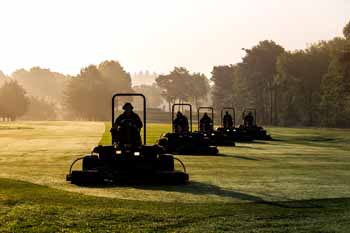Preparing for your staff for a major event
In its latest column, the National Golf Clubs’ Advisory Association (NGCAA) explores the legal issues golf clubs should consider in the build up to hosting big tournaments.
As we turn our attention from Shinnecock Hills to Carnoustie for the Open this month, we look at some of the issues facing golf clubs when preparing for major club tournaments and events.
Not many clubs will have the financial resources of the USGA or The R&A, so cost is likely to be a factor for most club managers and committees. This will include getting the most out of existing employees by using any contractual flexibility before calling upon extra temporary labour.

Greenkeepers preparing Wentworth’s West Course for the BMW PGA Championship in May. It is worth including a specific employment contract provision, specially for greenkeeping staff, to allow for seasonal flexibility
The contract of employment with existing employees will be the starting point, so ensure that you consider having the following clauses in the contract:
- With salaried employees, ensure that you have a clause to say that they may be required to work extra hours, beyond the core contracted hours, for the proper performance of the job.
- It is worth including a specific provision, specially for greenkeeping staff, to allow for seasonal flexibility. Many clubs will include a clause which has a shorter working week through the winter, but which flexes up in the summer months. The salary level stays the same flat-rate throughout the year, but the hours fluctuate to reflect the extra work that needs to be done in the summer. It is a good example of flexibility and one which should be clearly stated in the contract.
Such clauses can be further embellished to set out that specific tournaments will require extra hours of work from the employee.

- For other employees, ensure that they can be required to work overtime if the needs of the business dictate. Such clauses will normally have a provision for enhanced overtime rates to be paid, which is normally a sufficient incentive
- For all employees, ensure that the clause relating to their duties allows you to require them to carry out other duties, at least on a temporary basis, as the needs of the club dictate. The last thing that the club wants is for an employee to turn around in the run-up to a tournament and announce that it is not their job to assist a colleague!
- Ensure that you police holiday requests properly in the run-up to the tournament, refusing any requests for holidays during the busy period. It is quite permissible to do so under the working time regulations and some clubs will have a specific clause within the contract to, bar the taking of holidays during peak periods.
Beyond the above, a club should also take care with health and safety, to ensure that there are no lax practices when employees are rushing around with preparations and with the running of the tournament. This will be something that you would seek to reinforce through management and timely reminders in advance and during the tournament, at the same time as having updated risk assessments and policies.
The working time regulations may also come into play during the peak period. Employees should not work more than an average of 48 hours per week over an average 17-week period. It is quite possible that employees could work more than 48 hours during, say, a two-week period in the run-up to and during a tournament, but when taken as an average over 17 weeks, it may be that there is no issue. However, care should be taken if your existing employees are already close to the 48-hour week and the club should look at having employees sign an ‘opt out’ agreement (or have that clause built in to the employment contract) to say that they are not bound by the requirements of the 48-hour week.

Rest breaks are also extremely important from a health and safety and working time regulations perspective. If your employee works for more than six hours a day, they are entitled to a rest break of a minimum of 20 minutes; further, they are entitled to daily rest period of 11 hours in any 24-hour period; and finally, the weekly rest period is either one rest period of at least 48 hours every 14 days or two periods of 24 hours every 14 days. During a tournament, it might not always be possible to have such rest available, although it is strongly recommended that this is scheduled in to the rota. If it is not possible, there are special provisions allowed by the law where there is a surge in activity such as a tournament. A club should be certain that they would fit within the legal exceptions by taking advice from NGCAA if this looks likely. In these circumstances, providing that the necessary legal requirements have been hit, the club would still be required to provide ‘compensatory rest’ at a time after the tournament.

In addition to running the tournament by relying upon existing employees, the club may require more people, which it may source in different ways. Certain aspects could be undertaken by sub-contractors, such as outside catering. The club may wish to engage agency workers, in which case it should take care with the terms and conditions between the club and the agency.
Finally, the club may engage the services of workers or employees direct by the use of short fixed-term contracts or by the use of its existing ‘casual’ or zero hours workers or employees. Again, care should be taken over the terms of engagement with any extra labour and we would suggest taking advice before any extra personnel are engaged.
However a club seeks to flex up its labour for a tournament, if there is any doubt as to the legalities of the operation, please contact NGCAA for advice.

Chief Executive Alistair Smith leads the National Golf Clubs’ Advisory Association (NGCAA) in providing guidance and support on all legal matters impacting golf clubs.
The National Golf Clubs’ Advisory Association (NGCAA)
The Threshing Barn, Homme Castle Barns,
Shelsley Walsh, Worcestershire, WR6 6RR
Tel: 01886 812943
email info@ngcaa.co.uk















Let me tell You a sad story ! There are no comments yet, but You can be first one to comment this article.
Write a comment